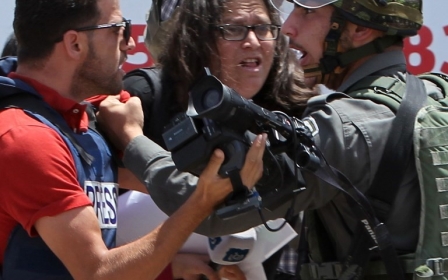Human Rights Watch mounts first legal case against Israeli boycott ban

Human Rights Watch has mounted the first legal challenge against an Israeli law that bans individuals and groups who support the boycott of Israel from entering the country.
Earlier this month, Israel ordered Omar Shakir, the organisation's Israel and Palestine director, to leave the country and threatened to take his work permit.
His deportation order is the first time a Human Rights Watch (HRW) representative has been ordered to leave Israel, according to the organisation.
Shakir disputes that he has supported the BDS movement and says that Israel is attempting to silence HRW's work against human rights violations inside Israel and the Occupied Palestinian territories.
Last March, an amendment to Israel's so-called anti-boycott law was passed, allowing authorities the right to refuse entrance to those they claim to be BDS activists.
The challenge comes a day after Israeli forces killed 62 people in Gaza after Palestinians protested as part of the "Great March for Return" and against the US embassy move to Jerusalem.
On Wednesday, Shakir told Middle East Eye that HRW was "determined to challenge" the boycott law which he described as "threatening the basic rights of thousands who live in Israel and Palestine and many more who wish to travel here."
"We are confident the court will see how dangerous this law is and reverse this decision.”
In Shakir's deportation order, which was based on a recommendation from Israel's Strategic Affairs Ministry, Israel cited his support for the Boycott, Divestment and Sanctions (BDS) movement as justification for his ban.
The BDS movement calls for a cultural, academic and consumer boycott of Israel until it complies with international law and ends its illegal occupation of the West Bank and blockade of Gaza.
Israeli Interior Minister Ariye Deri has also said publicly that Shakir supported the boycott of Israel.
In a tweet posted earlier this month, Deri confirmed that he had not approved Shakir's work permit and said: "Shakir supports the boycott of Israel, calls for divestment, and imposing sanctions on the country. Such a man must not remain in Israel."
However, the Interior Ministry has acknowledged that "no information has surfaced regarding such (boycott) activities," since Shakir joined HRW.
HRW has previously said it has never advocated support of the BDS movement.
Last year, Israel's Ministry of Interior Affairs accused HRW of being "engaged in politics in the service of Palestine propaganda, while falsely raising the banner of 'human rights'".
Boycott law
Earlier this month, Israel's Strategic Affairs Ministry released a list of 20 organisations from across the world that are officially banned from entering the country, because they support the BDS movement.
Founded in 2006 by the then-deputy prime minister and now Defence Minister Avigdor Lieberman, the strategic affairs ministry was created to coordinate security and plans against "strategic threats" posed to Israel.
Among the threats identified was the BDS movement which had been founded a year earlier after a call by a coalition of Palestinian civil society groups for boycott, divestments and sanctions as a form of non-violent pressure on Israel.
It recently achieved a huge win after more than 100 artists signed an open letter supporting New Zealand-based singer Lorde after she cancelled a Tel Aviv concert as part of the Palestinian call to boycott Israel.
New MEE newsletter: Jerusalem Dispatch
Sign up to get the latest insights and analysis on Israel-Palestine, alongside Turkey Unpacked and other MEE newsletters
Middle East Eye delivers independent and unrivalled coverage and analysis of the Middle East, North Africa and beyond. To learn more about republishing this content and the associated fees, please fill out this form. More about MEE can be found here.




